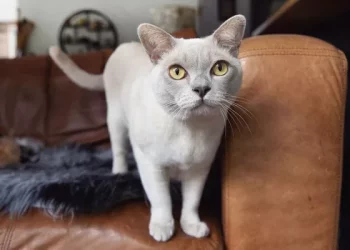Burmese cats are known for their affectionate nature, playful temperament, and strong bond with their owners. However, many Burmese cat owners notice that their feline companions seem to have an insatiable appetite. If you find yourself constantly refilling the food bowl or hearing persistent meows for more food, you might wonder: why is my Burmese cat always hungry? There are several reasons why your cat may have an increased appetite, ranging from normal behavior to underlying medical concerns. In this article, we will explore the factors influencing your Burmese cat’s hunger and what you can do to manage their diet effectively.
Natural High Energy Levels
Burmese cats are one of the most active and playful cat breeds. They are known for their boundless energy, love for climbing, and enthusiasm for interactive play. Because they burn a lot of calories through physical activity, they naturally require more food to replenish their energy levels. If your Burmese cat has a busy lifestyle—playing, running, and exploring—it makes sense that they would have a higher appetite compared to more sedentary breeds.
What to do: Ensure your Burmese cat is receiving a balanced diet with adequate calories to support their activity level. However, be mindful of portion control to prevent overeating.
Growth and Development
If your Burmese cat is still a kitten or a young adult, their body is growing rapidly, requiring additional nutrients and energy. During their early months, kittens need frequent meals to support healthy growth and development. Even after reaching adulthood, they may still have a naturally high metabolism that demands more food.
What to do: Feed a high-quality, protein-rich diet suited for your cat’s life stage. Kittens require more frequent feeding, while adult cats benefit from portioned meals to avoid overeating.
Genetic Factors
Some cat breeds, including the Burmese, have genetic predispositions that make them more food-driven. Burmese cats, in particular, are known to be enthusiastic eaters. They often seem to crave food more than other breeds, which can sometimes lead to overeating and weight gain.
What to do: Establish a structured feeding routine to prevent excessive eating. Avoid free-feeding and instead offer measured portions at scheduled times.
Boredom and Habit
Burmese cats are intelligent and social animals. If they are left alone for long periods or do not receive enough mental stimulation, they may develop food-seeking behavior out of boredom. Eating can become a source of entertainment or comfort rather than a response to genuine hunger.
What to do: Provide your Burmese cat with plenty of toys, climbing structures, and interactive play sessions to keep them engaged. Puzzle feeders can also help slow down eating and make mealtime more stimulating.
Food Quality and Nutritional Deficiency
If your cat is eating food that lacks essential nutrients, they may continue to feel hungry even after eating. Low-quality commercial cat food often contains fillers like corn and wheat, which may not provide sufficient protein and fat to satisfy their dietary needs.
What to do: Ensure your cat’s diet consists of high-quality protein sources, such as chicken, fish, or turkey. A grain-free diet or one with minimal fillers may be more satiating and nutritious.
Underlying Medical Conditions
If your Burmese cat’s hunger seems excessive and is accompanied by weight changes, excessive thirst, or unusual behavior, a medical condition might be the cause. Some common health issues that can lead to an increased appetite include:
Hyperthyroidism: A condition where the thyroid gland produces too much hormone, leading to increased metabolism and hunger.
Diabetes Mellitus: A disorder where the body cannot regulate blood sugar properly, causing increased appetite and thirst.
Gastrointestinal Issues: Conditions like inflammatory bowel disease (IBD) can make it difficult for your cat to absorb nutrients, leading to constant hunger.
Parasites: Intestinal parasites such as tapeworms can consume nutrients from your cat’s food, leaving them feeling hungry all the time.
What to do: If your cat’s appetite is extreme or has changed suddenly, consult your veterinarian for a full health checkup.
Stress and Anxiety
Burmese cats are highly sensitive to changes in their environment. If they experience stress—such as a new pet in the home, a move, or changes in routine—they may develop an increased appetite as a coping mechanism.
What to do: Create a stable and stress-free environment for your cat. Provide them with a safe space, consistent routines, and plenty of affection to help them feel secure.
Spaying or Neutering Effects
After being spayed or neutered, a cat’s metabolism may slow down, but their appetite may remain the same or even increase. This can lead to increased hunger and a tendency to gain weight if food intake is not managed.
What to do: Monitor portion sizes and ensure your cat gets regular exercise to prevent post-surgery weight gain.
Aging and Cognitive Changes
As Burmese cats age, their metabolism and digestion may change. Some older cats may feel hungrier due to changes in their ability to absorb nutrients efficiently. Cognitive changes, such as feline cognitive dysfunction (similar to dementia in humans), can also affect their eating habits.
What to do: If your senior Burmese cat is showing signs of increased hunger, consult your vet to rule out age-related health conditions and adjust their diet accordingly.
Feeding Mistakes and Overindulgence
It can be tempting to give in to your cat’s demands for extra food, especially when they use their charming personalities to beg for more treats. However, overfeeding can lead to obesity and related health problems.
What to do: Stick to a consistent feeding schedule and avoid overindulging in treats. Use measured portions and ensure your cat is eating a well-balanced diet.
Conclusion
If your Burmese cat seems constantly hungry, there could be several factors at play, ranging from natural breed characteristics to underlying health issues. By understanding the reasons behind your cat’s appetite, you can take steps to ensure they are eating the right amount of nutritious food while maintaining a healthy lifestyle. Regular vet checkups, proper portion control, mental stimulation, and a high-quality diet are all key to keeping your Burmese cat happy and well-fed.
If you ever have concerns about your cat’s hunger levels, consulting a veterinarian is always the best course of action. A professional assessment can help identify any medical concerns and provide tailored recommendations for your feline friend.
Related Topics:
























